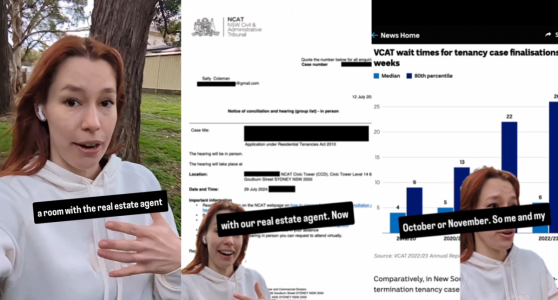Exposed: How Triple J's Sally Coleman battled her landlord and won—you won't believe what it was over!
By
- Replies 6
In a tale that could rival any courtroom drama, Triple J presenter Sally Coleman has shared a gripping account of her legal tussle with a landlord over a staggering $1100 cleaning bill. This saga, which unfolded in the corridors of the NSW Civil and Administrative Tribunal (NCAT), is a stark reminder of the potential pitfalls of rental agreements and the importance of knowing your rights as a tenant.
The dispute began when Coleman and her housemates were slapped with a hefty cleaning bill at the end of their lease—a bill they deemed completely unnecessary. Despite their efforts to leave the property in a clean state, the real estate agent insisted on professional cleaning services, which resulted in an invoice that left the tenants aghast.
The list of alleged cleaning misdemeanours included such trivialities as a speck of dirt on the floor, a single hair on the bathroom floor, and a whisper of dust in a cupboard. It's the kind of nitpicking that would have most tenants rolling their eyes in disbelief. But rather than acquiesce to the demands, Coleman and her housemates stood their ground, refusing to pay the exorbitant fee.
As the dispute escalated, their $6500 bond was held hostage pending the outcome of the tribunal case. The tenants, however, were not deterred. They armed themselves with over 40 pages of documentation, including photos and notes detailing the condition of the property upon their departure. Yet, in a conciliation hearing—an informal attempt to resolve the dispute before a formal hearing—the agent seemed uninterested in their meticulous evidence.
The landlord's intransigence was apparent when Coleman revealed that the owner would 'not budge' on the cleaning fee. It was a standoff that seemed less about cleanliness and more about extracting as much money as possible from the situation. The tenants, in a strategic move, offered a 'token amount' of $250 to settle the dispute, a far cry from the original $1100 demanded.
In a twist that highlights the importance of procedural fairness, Coleman pointed out that the absence of an itemized invoice for the cleaning services could have landed the landlord in hot water. Under Section 165 of the NSW Tenancy Act, landlords are required to provide such documentation within seven days of making a claim on a rental bond. Failure to do so can result in fines of up to $2000.
The landlord's agent, undeterred by the potential penalties, seemed to embody a cavalier attitude towards the legal requirements—a stance that Coleman suggests is indicative of a broader issue within the rental industry. The implication is clear: some agents may prioritize the satisfaction of high-value clients over the rights of tenants, even if it means skirting the law.
In the end, the tenants' resilience paid off. The $250 offer was accepted, and the bond was returned. Coleman's story is not just a personal victory but a beacon of hope for tenants everywhere. It underscores the power of knowledge, the importance of documentation, and the necessity of standing up for one's rights.
For our readers, especially those in their golden years who may be renting, this story is a reminder to always be vigilant about your rental agreements. Ensure you understand the terms and conditions, document the state of the property upon moving in and out, and don't be afraid to challenge unfair demands. Remember, the law is there to protect you, and as Sally Coleman's case shows, even the most daunting landlords can be held accountable.
Credit: @thesallycoleman / Instagram

We'd love to hear about your rental experiences. Have you ever had to fight for your bond? What advice would you give to fellow renters? Share your stories and tips in the comments below!
The dispute began when Coleman and her housemates were slapped with a hefty cleaning bill at the end of their lease—a bill they deemed completely unnecessary. Despite their efforts to leave the property in a clean state, the real estate agent insisted on professional cleaning services, which resulted in an invoice that left the tenants aghast.
The list of alleged cleaning misdemeanours included such trivialities as a speck of dirt on the floor, a single hair on the bathroom floor, and a whisper of dust in a cupboard. It's the kind of nitpicking that would have most tenants rolling their eyes in disbelief. But rather than acquiesce to the demands, Coleman and her housemates stood their ground, refusing to pay the exorbitant fee.
As the dispute escalated, their $6500 bond was held hostage pending the outcome of the tribunal case. The tenants, however, were not deterred. They armed themselves with over 40 pages of documentation, including photos and notes detailing the condition of the property upon their departure. Yet, in a conciliation hearing—an informal attempt to resolve the dispute before a formal hearing—the agent seemed uninterested in their meticulous evidence.
The landlord's intransigence was apparent when Coleman revealed that the owner would 'not budge' on the cleaning fee. It was a standoff that seemed less about cleanliness and more about extracting as much money as possible from the situation. The tenants, in a strategic move, offered a 'token amount' of $250 to settle the dispute, a far cry from the original $1100 demanded.
In a twist that highlights the importance of procedural fairness, Coleman pointed out that the absence of an itemized invoice for the cleaning services could have landed the landlord in hot water. Under Section 165 of the NSW Tenancy Act, landlords are required to provide such documentation within seven days of making a claim on a rental bond. Failure to do so can result in fines of up to $2000.
The landlord's agent, undeterred by the potential penalties, seemed to embody a cavalier attitude towards the legal requirements—a stance that Coleman suggests is indicative of a broader issue within the rental industry. The implication is clear: some agents may prioritize the satisfaction of high-value clients over the rights of tenants, even if it means skirting the law.
In the end, the tenants' resilience paid off. The $250 offer was accepted, and the bond was returned. Coleman's story is not just a personal victory but a beacon of hope for tenants everywhere. It underscores the power of knowledge, the importance of documentation, and the necessity of standing up for one's rights.
For our readers, especially those in their golden years who may be renting, this story is a reminder to always be vigilant about your rental agreements. Ensure you understand the terms and conditions, document the state of the property upon moving in and out, and don't be afraid to challenge unfair demands. Remember, the law is there to protect you, and as Sally Coleman's case shows, even the most daunting landlords can be held accountable.
Credit: @thesallycoleman / Instagram
Key Takeaways
- Triple J presenter Sally Coleman shared her experience with a legal dispute over a $1100 cleaning bill from her landlord after moving out of a rental property.
- Despite cleaning the property themselves, Sally and her housemates faced claims for additional professional cleaning and had their $6500 bond withheld.
- The issue escalated to the NSW Civil and Administrative Tribunal (NCAT), with the landlord eventually accepting a much lower settlement of $250.
- Sally pointed out that failure to provide an itemised invoice within seven days could result in fines under the NSW Tenancy Act, highlighting the pressure the tenants can use against overbearing landlords or agents.
We'd love to hear about your rental experiences. Have you ever had to fight for your bond? What advice would you give to fellow renters? Share your stories and tips in the comments below!








